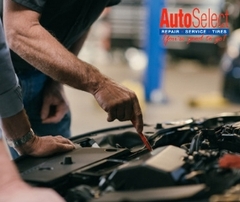
By following a car maintenance schedule, you can help prevent major problems before they occur. Not only that, but keeping a detailed vehicle maintenance history can help improve your car's resale value, too! Many manufacturers use a 30-60-90 schedule, meaning certain items need to be inspected, changed or replaced at 30,000, 60,000, and 90,000 miles. But you may wonder if every suggested maintenance checkpoint in your car manual is essential for the health and well-being of your car. Some items, like rubber gaskets and hoses, windshield wiper blades, and tires, will wear out at irregular intervals. These “consumables” will need to be checked periodically, either by your mechanic or via your own visual inspection. For everything else, this car maintenance guide explains what you should do and why you should do it.
REGULAR MAINTENANCE
Oil and Oil Filter: Your engine oil and oil filter need to be changed regularly, The non-synthetic oil that was traditionally used in the past always had a 3,000-mile rule of thumb, but most cars today run on synthetic oil, which can safely last between 5,000 and 10,000 miles between oil changes, depending on the type.
Tires: Your car's tires should be checked regularly to ensure they are in good shape. Tire rotation every 6,000-8,000 miles (or according to your vehicle handbook) will help to even out wear.
MAINTENANCE EVERY 30,000 MILES
Air Filter: A clogged air filter makes it harder for your engine to breathe, and that can negatively impact performance. Changing the air filter every 15,000 to 30,000 miles is a good rule.
Fuel Filter: If your fuel filter gets clogged, the engine will run rough, or not at all. Manufacturer suggestions on fuel filters vary widely, but some recommend replacing your filter as early as 30,000 miles. Your best option is to ask your mechanic to perform a pressure test to determine the health of your fuel filter.
MAINTENANCE EVERY 60,000 MILES
Battery: Extreme temperatures, age, and long periods of non-use affect batteries. Keep in mind that batteries are warrantied and pro-rated by time, not mileage, and are designed to wear out. Most batteries will last four or five years, which puts the average driver right around 50,000 to 60,000 miles.
Brake Fluid: Your brakes are engaged through a hydraulic system. But when the fluid in that system is contaminated by water, its boiling point is lowered, and it can turn to gas—which is compressible. This leads to a “squishy” brake pedal. Most manufacturers recommend doing this every 20,000 to 45,000 miles.
Brake Pads/Shoes: Brake pads and shoes are designed to wear out, and usually make screeching noises when they need to get replaced. Have them checked on a regular basis. A good set can last up to 50,000 miles.
Brake Rotors: Your brakes work by squeezing the pads against metal discs (called rotors) to slow the vehicle. Rotors get subjected to lots of heat due to the friction between them and the brake pads, and they can warp over time. Most at roughly 60,000 miles.
Coolant: A mix of water and antifreeze flows through your car engine's radiator to keep it at the correct temperature. If you lose too much coolant, the engine will overheat, which can cause severe damage. Plan to replace your coolant at 60,000 miles, and make sure your mechanic flushes the entire cooling system while they’re at it!
Transmission Fluid: Low transmission-fluid levels will cause shifting problems and can burn up the transmission. It is important to monitor your transmission fluid regularly, rather than adhere to a specific mileage marker. Healthy fluid will be pink and smell sweet, while bad transmission fluid will be darker red, or even brown, and smell burnt. Generally, if you have a manual transmission, plan to change the transmission fluid between 30,000 and 60,000 miles. Automatic transmission fluid has a lifespan ranging from 30,000 to well over 100,000 miles.
MAINTENANCE EVERY 90,000 MILES
Hoses: The hoses on your car carry coolant, power steering fluid, and gases for the air conditioning system. As the rubber ages, cracks can form, and a busted hose will cause trouble in a hurry, so have them checked and changed as needed, particularly as your car approaches six-figure mileage.
Power Steering Fluid: Low power steering fluid will cause heavy steering or excessive noise while turning the wheel. Plan to flush and replace your power steering fluid around 75,000 miles, or when problems arise.
Spark Plugs/Ignition System: When components of your ignition system fail, you may get a “check engine” light on the dash, hard starting, or rough running. Your mechanic will be able to plug a laptop into your car to look for a “code” that will tell them what needs to be replaced. Most new cars use iridium or titanium spark plugs, which can sometimes last up to 100,000 miles, let alone 90,000. But be careful when it comes to this particular element of car care: Cheaper spark plugs, made of copper, are still in use and typically need to be replaced by 30,000 miles.
Timing Belt: Cars that use a timing belt rather than a timing chain need to worry about this bit of maintenance. We recommend changing your belt preemptively between 75,000 and 90,000 miles.
Keep in mind that these milestones are just guidelines, and your Auto Select mechanic should be consulted for a more precise maintenance schedule. If your vehicle is due for service, ask your advisor how your 30,60,90 parts are holding up!